Nyheter fra The Thaiger
My RSS Feed
- Thailand visa guide: Electronic vs physical applications explained
The visa application process for Thailand, whether for short-term visits or extended stays, constitutes a multifaceted terrain necessitating meticulous navigation. The launch of electronic visas in November 2021 for Dutch and Belgian passport holders marks a pivotal shift towards digitization, providing an efficient substitute to the conventional embassy application methodology. This evolution reflects a wider …
The story Thailand visa guide: Electronic vs physical applications explained as seen on Thaiger News.

Thailand visa guide: Electronic vs physical applications explainedLegacy The visa application process for Thailand, whether for short-term visits or extended stays, constitutes a multifaceted terrain necessitating meticulous navigation. The launch of electronic visas in November 2021 for Dutch and Belgian passport holders marks a pivotal shift towards digitization, providing an efficient substitute to the conventional embassy application methodology. This evolution reflects a wider movement towards the digitization of travel documentation procedures, emphasizing the imperative for travellers to familiarize themselves with both digital and traditional application approaches.
Individuals deliberating between submitting an electronic application and visiting an embassy in person are confronted with a common predicament among international travellers. This decision often hinges on various factors, including airline regulations or specific visa categories such as the Thailand SMART Visa. Each pathway entails distinct steps, requirements, and considerations designed to accommodate diverse needs and circumstances.
This article serves to elucidate the Thai visa application process by providing authoritative advice on both electronic and in-person applications. It furnishes readers with critical updates on the latest visa options available, thereby facilitating an informed choice that complements their travel objectives and logistical requirements. Through a detailed exploration of this subject matter, this guide aims to equip prospective visitors to Thailand with the necessary information for a seamless travel preparation experience.
Types of visas for Thailand
Navigating the options for obtaining a visa for Thailand requires understanding the various types available. Whether you’re applying visa physically or electronically in Thailand, it’s crucial to select the appropriate category based on your travel or long-term stay plans.
Single-entry tourist visa
A Single Entry Tourist Visa offers a straightforward approach for travellers planning a one-time visit. Valid for 60 days, this visa caters to those visiting for tourism, leisure, or medical reasons. With a 3-month validity from the approval date, applicants have ample time to enter Thailand. Extensions are possible, allowing an additional 30-day stay upon visiting a Thai Immigration Office. This option simplifies travel plans, ensuring a smooth process for tourists.
Multiple entry tourist visa
For more frequent visitors, the Multiple Entry Tourist Visa ensures flexibility. This visa permits unlimited entries over 6 months, appealing to tourists and those with medical purposes in mind. It’s an ideal choice for travellers seeking to explore Thailand in depth or those needing repeated entry for health care.
Long-stay visas
Long-stay visas cater to individuals planning extended periods in Thailand. These encompass the Non-Immigrant Visa types such as OA (Long Stay) or OX (Long Stay for emigrants), with validity extending up to a year for certain types. Designed for those aged 50 and above, retirees, or those emigrating, these visas facilitate longer dwellings, embracing Thailand’s culture and lifestyle.
Special categories: Business, Medical, Student, and Diplomatic visas
Special categories address specific needs. Business Visas (B, B-A, IB) support those with a valid work permit, whereas Medical Visas (Non-Immigrant O) are for longer-term medical treatments. Student Visas (Non-Immigrant ED) serve non-Thai passport holders enrolled in recognized institutions. Diplomatic Visas (F) accommodate diplomats, ensuring a wide range of purposes are covered under Thailand’s visa framework. Each category has defined criteria, ensuring applicants are matched with the right visa for their circumstances.
Understanding these options and whether to apply visa physically or electronically in Thailand assists in planning your trip or moving smoothly, making sure you select the visa that best fits your needs.
Choosing between Physical and Electronic visa applications

Photo via Dall-E Pros and cons of Physical visa applications
Opting to apply for a visa in person means popping into a Thai embassy or consulate. It’s the classic way that offers a personal touch, thanks to face-to-face chats with the embassy team. This method is great because it lets you get immediate answers and sort out any little application glitches right there and then. But, just so you know, this path does ask for a chunk of your time to visit the embassy, which might be a bit of a hassle depending on where you live and your work schedule. Plus, getting there might cost you in travel bucks, and if you’re coming from far away, you might need to think about where to stay overnight.
Pros and cons of Electronic visa applications
Choosing to submit your visa application through electronic means provides a notable advantage in terms of convenience and flexibility. Applicants have the liberty to file their applications from any location, at any time, eliminating the necessity of physical visits to an embassy or consulate. This efficiency not only conserves time but also diminishes travel expenses. Digital submissions are generally processed swiftly, rendering them suitable for urgent travel arrangements. Nevertheless, potential challenges such as website malfunctions or the absence of direct assistance may arise. Errors committed during the submission process could result in delays or denial of the application, frequently without the chance for prompt rectification.
Eligibility for E-visa application
Applying for your Electronic Visa (E-Visa) to visit the beautiful country of Thailand is pretty straightforward, but let’s not forget a couple of key points! Firstly, depending on where your passport is from can make quite a difference because Thailand offers special e-visa arrangements with certain countries. So, it’s a smart move to pop over to Thai immigration’s official website now and then just to double-check that you’re all set. Also, having your passport ready and meeting all the necessary criteria for an E-Visa application is super important. Plus, choosing the right visa category that fits perfectly with your plans in Thailand will help ensure your application sails through without a hitch. Just a little heads-up: paying attention to detail during this process goes a long way.
How to apply for an E-visa to Thailand

Photo via Dall-E Registration and documentation
Ready to kickstart your Thai adventure with an e-visa? First things first, pop over to the official Thai e-visa website and sign yourself up. You’ll just need your email and to pick a password – easy peasy! Once you’re all set up, grab your passport (make sure it’s good for six months past your trip) and a recent photo of yourself that fits their guidelines. Depending on which visa you’re going for, you might also need to show your flight and hotel bookings. All this prep is your ticket to diving into Thailand’s amazing culture. Can’t wait for you to experience it.
Payment and processing time
Upon the successful upload of all requisite documents, the subsequent phase entails remitting payment for the visa application fee. The cost is contingent upon the category of visa, commencing at 30 Euro for a Transit Visa and escalating to 175 Euro for specific categories of Non-Immigrant Visas. It is imperative to acknowledge that certain debit/credit card issuers may levy additional service charges throughout the online payment procedure. The Royal Thai Embassy disclaims any responsibility for these ancillary fees.
Upon successful transaction, the status of your application will be updated to ‘processing’. The duration for processing generally spans from 3 to 7 business days. Nevertheless, this timeframe may fluctuate based on the thoroughness and nature of the documents provided, the particular visa classification, and the applicant’s nationality. Applications that are not fully completed or lack necessary documentation may experience delays in processing.
Email notifications and receiving your visa
Throughout the e-visa application procedure, applicants shall be apprised of their application’s status via email notifications. Such communications will inform them of any inconsistencies or further details needed. Following the approval of the e-visa, an email will be sent with an attachment encompassing the e-visa itself. This document must be printed and shown upon entry into Thailand. Remember, having your e-visa checked upon arrival is a crucial step, as immigration officers will verify its validity at airports or border crossings in Thailand. Ensuring your application is accurate and complete is the key to a smooth travel experience to Thailand.
Physical visa application process
Choosing between submitting a visa application online or proceeding with an in-person visit to the embassy represents a critical decision. The digital method offers undeniable convenience and efficiency, yet the conventional approach still holds value. For applicants who prefer tangible interactions or require visas unavailable through electronic platforms, an embassy visit provides direct communication and immediate assistance. It is essential, whether opting for the digital ease of an e-visa or the personal interaction of an in-person application, to ensure the accuracy and completeness of all documentation. Such meticulousness will not only streamline the application process but also contribute to a seamless travel experience to Thailand. Irrespective of the selected method, applicants are on their path towards immersing themselves in the rich culture and breathtaking landscapes of this distinguished country.
Embarking on a journey to the Schengen Area from Thailand requires careful planning. This ultimate guide simplifies the Schengen visa application process for Thai residents, highlighting essential steps, documentation, and tips to ensure a successful application. Navigate through the complexities of obtaining your Schengen visa with ease and confidence.
The story Thailand visa guide: Electronic vs physical applications explained as seen on Thaiger News.
23 April 23 2024Visa Informationhttps://thethaiger.com/?p=740210 - Thailand’s visa on arrival guide: Smooth entry for a perfect holiday
Preparing for a journey to the illustrious Kingdom of Thailand? Renowned for its captivating landscapes, exquisite cuisine, and dynamic cultural tapestry, Thailand invites travellers with its array of attractions. However, before indulging in this bizarre destination, one pivotal step remains: obtaining your visa on arrival (VoA). For those envisioning serene beachside retreats or engaging in …
The story Thailand’s visa on arrival guide: Smooth entry for a perfect holiday as seen on Thaiger News.
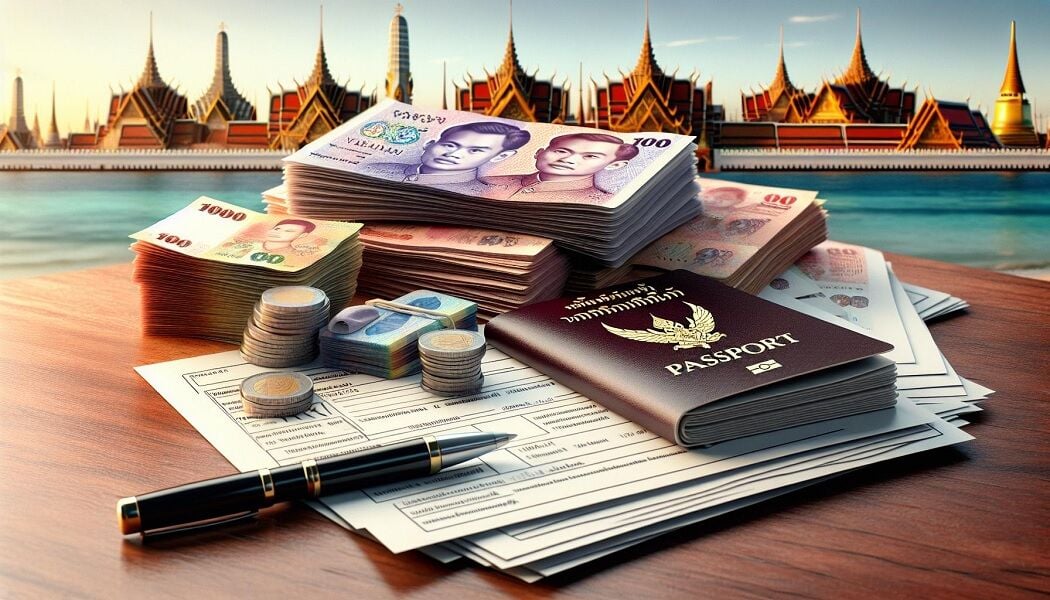
Thailand’s visa on arrival guide: Smooth entry for a perfect holidayLegacy Preparing for a journey to the illustrious Kingdom of Thailand? Renowned for its captivating landscapes, exquisite cuisine, and dynamic cultural tapestry, Thailand invites travellers with its array of attractions. However, before indulging in this bizarre destination, one pivotal step remains: obtaining your visa on arrival (VoA). For those envisioning serene beachside retreats or engaging in the hustle and bustle of local markets, understanding the prerequisites for a Thailand VoA is imperative.
Thailand’s hospitable approach towards international visitors simplifies the VoA acquisition process for nationals from 18 designated countries. By presenting a handful of essential documents upon arrival, you can transition seamlessly from air travel to experiencing Thai bliss with minimal complications. This article serves as an authoritative guide on navigating the VoA procedure effortlessly.
By familiarizing yourself with the required documentation and preparing accordingly, you can facilitate a seamless entry into Thailand, mirroring the smoothness of its renowned silk production. We will now explore the essential information concerning the documentation needed for a Thailand visa on arrival, equipping you with an unparalleled exploration of Southeast Asia’s gem.
Understanding the Thailand visa on arrival
Eligibility criteria for visa
Getting a Visa on Arrival (VoA) for Thailand is super smooth for folks from the 18 eligible countries. Just make sure your passport is valid for at least 30 days more than you plan to stay, and have your return ticket ready to show you’ll be heading back within the 15-day VoA period. With these key requirements met you are well-prepared for an efficient visa acquisition experience. Furthermore, demonstrating financial solvency through evidence of sufficient funds for the duration of their stay – quantified as at least 10,000 THB per individual or 20,000 THB per family – is obligatory. These prerequisites are crucial for VoA applications and reflect Thailand’s dedication to facilitating orderly and efficient admissions for qualified visitors.
Visa on arrival vs visa exemption
Starting your Thailand journey smoothly hinges on knowing if you need a Visa on Arrival (VoA) or if you’re all set with a Visa Exemption! If you’re from one of the 18 fortunate countries, picking up your VoA right when you land in Thailand is as easy as pie. Just bring along your passport and some proof that you’ll be adventuring beyond Thailand eventually, and voila, you’re all set. It’s incredibly handy, taking one worry off your pre-trip checklist.
On the flip side, if your country is buddy-buddy with Thailand on visa matters, you might just skip the visa line entirely! Thanks to Visa Exemption agreements, tourists from these countries can enjoy up to 30 or 45 days exploring beautiful beaches and bustling markets without needing a visa at all. It’s all about making your entry as smooth as possible.
Choosing between a VoA and relying on Visa Exemption boils down to where you’re from and how long you plan on soaking up the Thai sun. So, it’s pretty important to check what applies to you before setting off. Securing a VoA in Thailand is straightforward if you’ve got everything in order – just another step towards an unforgettable journey. Keeping these visa tips in mind ensures that preparing for your trip is part of the fun, paving the way for an amazing time in Thailand.
Documents required for Thailand visa on arrival

Photo via Dall-E Navigating through the documents required for a Thailand Visa on Arrival (VoA) ensures your journey starts without hiccups. Here’s a concise guide to what you need.
Passport requirements
Your passport acts as the key to your Thai adventure. It must be valid for at least 30 days upon entry. Ensure it has at least one blank page for the visa stamp. This is non-negotiable, as authorities at the port of entry will verify these details meticulously.
Proof of sufficient funds
Thailand wants to ensure you can financially support your stay. You’re required to show proof of funds amounting to at least 10,000 Thai Baht per individual or 20,000 Thai Baht per family. Bank statements or cash are commonly presented documents to fulfil this requirement.
Accommodation details
Proof of where you’ll stay during your visit underscores your travel plans’ credibility. Whether it’s a hotel booking, a rental confirmation, or a letter of invitation from a host, having this document ready confirms your accommodation arrangements in Thailand.
Return travel documentation
Lastly, demonstrating your intent to leave Thailand within the visa’s validity is crucial. This involves showing a return ticket or an onward journey ticket to another destination. It reassures authorities of your temporary stay, aligning with the VOA’s conditions.
Remember, each document plays a critical role in ensuring a seamless entry into Thailand with a Visa on Arrival. Double-check your documents before departure to enjoy the Land of Smiles without any administrative hitches.
Applying for a Thailand visa on arrival
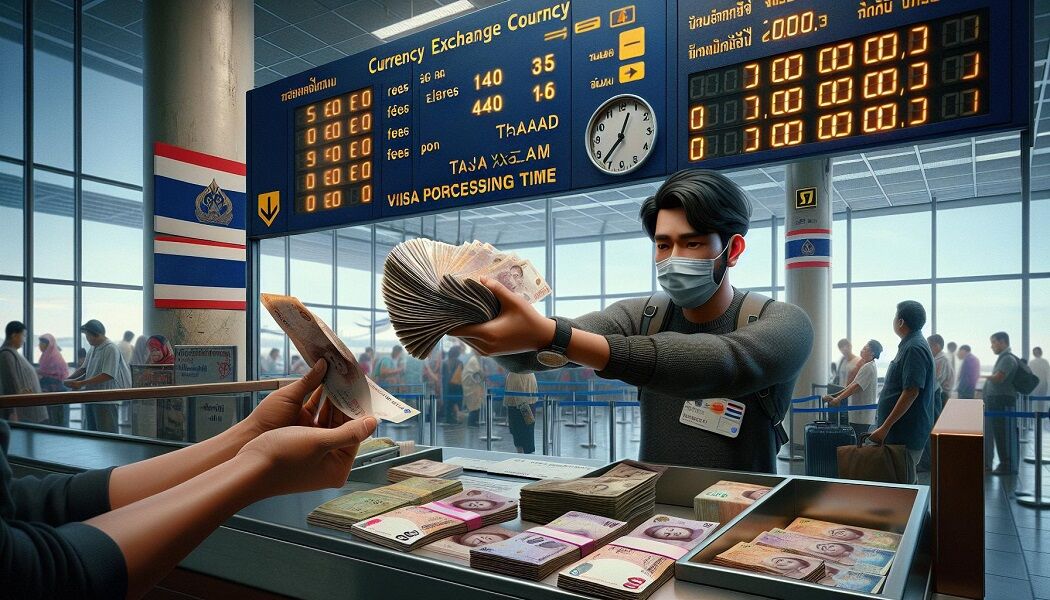
Photo via Dall-E Where to apply: airports and land entry points
Your journey begins at one of Thailand’s designated entry points. If flying, head to the Visa on Arrival (VoA) section upon landing. For land entries, locate the VoA counter at border crossings. Major airports like Suvarnabhumi, Don Mueang, Phuket, and Chiang Mai facilitate VoA services. Similarly, land borders with VoA provisions include Nong Khai (near Laos) and Sadao (bordering Malaysia). Remember, your entry point dictates where you’ll manage VoA paperwork.
Prepare the necessary documents: Ensure you have all documents required for Thailand Visa on Arrival. This includes a valid passport with at least 30 days remaining and a blank page, a confirmed return ticket within 15 days, proof of accommodation in Thailand, and evidence of sufficient funds (at least 10,000 THB per individual or 20,000 THB per family).
Locate the VoA counter: Upon arrival, follow the signs to the Visa on Arrival area. It’s usually near the immigration checkpoints.
Complete the application form: Forms are available at the counter. Fill in every detail accurately to prevent delays.
Submit your documents: Hand over your passport, completed form, and all other documents to the officer. A passport-sized photo (4×6 cm) might also be required, so it’s wise to carry a few.
Pay the visa fee: The fee is payable in Thai currency (THB). The exact amount can vary, so check the latest fee before travel. Payment methods may be limited to cash at some entry points.
Wait for processing: After submission, wait for your documents and visa stamp. Processing time can vary based on the queue.
Collect your passport: Once processed, your passport will be returned with a Visa on Arrival stamp, allowing a 15-day stay in Thailand.
Adhering to these steps simplifies the VoA process. Ensure all documents are ready and accurate, aiding a smooth entry into Thailand. Remember, the Visa on Arrival enables a short visit, so plan accordingly to comply with its 15-day limitation.
Fees and processing time for visa on arrival
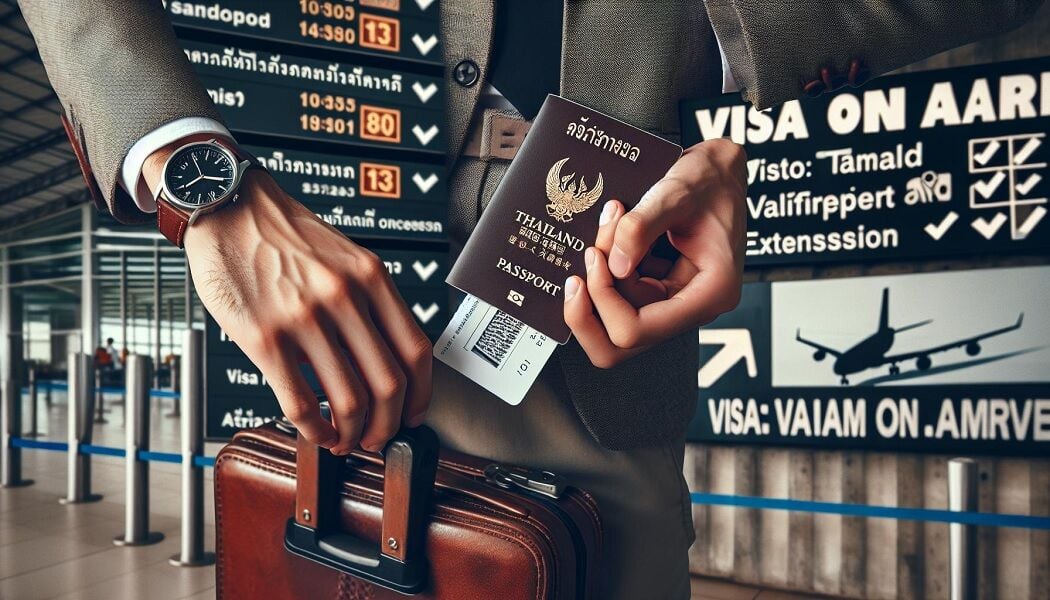
Photo via Dall-E Transitioning from understanding the documents required for a Thailand Visa on Arrival, it’s crucial to address the financial and temporal aspects tied to this process. Knowledge of the fee structure and expected waiting time directly impacts your planning and experience.
Fee structure
Just so you know, getting your Visa on Arrival in Thailand usually costs about 2,000 Thai Baht, which is roughly around USD 60. But hey, there have been times, like back in 2018 and until April 2020, when the Thai government was super cool and waived these fees! Remember though, you’ll need to pay this fee in cash and only with Thai currency when you get there. Also, heads up: these fees can change out of the blue, so it’s a good idea to double-check how much it’ll be before your trip. And just a little tip – this fee isn’t given back if for some reason your visa application doesn’t go through or gets rejected. So having the exact cash ready can make things smoother for you as soon as you land.
Expected waiting time
Just a heads up that the time it takes to snag your Visa on Arrival can vary quite a bit. It depends on how bustling the airport is and how speedy the immigration crew is feeling. On average, you might want to set aside about 15 minutes to an hour to breeze through everything. So, it’s smart to come prepared and stay chill throughout the process. Understanding both the cost structure and expected processing time for a Visa on Arrival ensures you’re well-prepared, financially and timewise, for your journey to Thailand. It highlights the need for readiness to meet these requirements to facilitate a smoother entry experience.
Validity and extension of Thailand visa on arrival
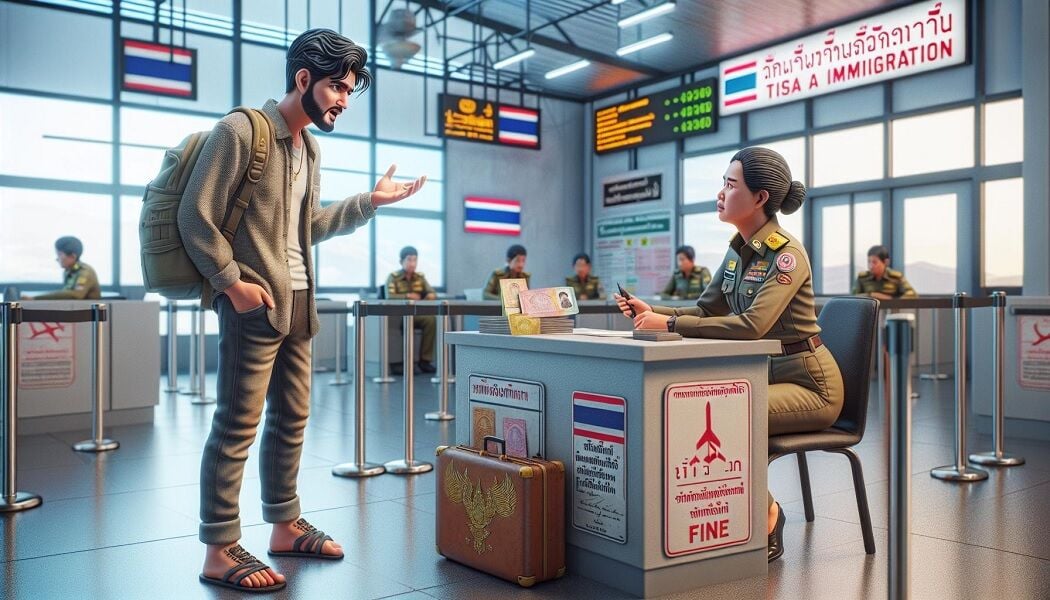
Photo via Dall-E Validity period
Your Visa on Arrival (VoA) for Thailand is valid for a brief period of 15 days from the date of entry. This timeframe suits short visits focused on tourism. As you prepare your travel itinerary, remember this limited duration to ensure your plans align with the validity period. Planning ensures a hassle-free stay in Thailand, leveraging the convenience of a VoA.
Extension guidelines
Extending your VoA once in Thailand is generally not an option, except under extenuating circumstances such as illness that prevents travel. For tourists needing more time, understanding this limitation is crucial. In case of an unforeseen need to stay beyond the permitted 15 days, contacting the local immigration office promptly for guidance is advisable. Always carry the required documents to support your extension request, especially in special situations, to facilitate a smoother process. Being informed about these guidelines helps manage your expectations and plan accordingly.
Alternatives to the Thailand visa on arrival
Exploring Thailand’s Visa on Arrival (VoA) is just the beginning of your journey. It’s essential to remember that this option is perfect for short tourism visits, given its 15-day validity. If you’re planning a longer stay or different activities, consider other visa types that better suit your needs. Always keep the validity period in mind to avoid the severe penalties for overstaying. By staying informed and prepared, you’ll ensure your visit to Thailand is both enjoyable and hassle-free.
For business and work visas in Thailand, applicants must secure a job offer or business sponsorship. Essential documents include a valid passport, employment or business documentation, and proof of financial means. The process involves obtaining a non-immigrant visa, followed by a work permit, enabling long-term employment and business activities in Thailand.
The story Thailand’s visa on arrival guide: Smooth entry for a perfect holiday as seen on Thaiger News.
23 April 23 2024Visa Informationhttps://thethaiger.com/?p=739999 - Indian coffee trader busted with 10 anacondas on Bangkok flight
Customs officials intercepted a 56 year old coffee trader from Sakleshpur, India with a suitcase filled with 10 baby yellow anacondas, on a flight from Bangkok to Bengaluru. At Kempegowda International Airport, the trader, arriving on Thai Air Asia Flight No. FD-137, was swiftly apprehended on Saturday night, sparking a high-stakes investigation into the illicit …
The story Indian coffee trader busted with 10 anacondas on Bangkok flight as seen on Thaiger News.

Indian coffee trader busted with 10 anacondas on Bangkok flightLegacy Customs officials intercepted a 56 year old coffee trader from Sakleshpur, India with a suitcase filled with 10 baby yellow anacondas, on a flight from Bangkok to Bengaluru.
At Kempegowda International Airport, the trader, arriving on Thai Air Asia Flight No. FD-137, was swiftly apprehended on Saturday night, sparking a high-stakes investigation into the illicit trafficking of exotic reptiles.
The unsuspecting trader fell prey to the allure of quick riches, ensnared by promises of 20,000 Rupees (approximately 8,900 baht) for a simple handover at the airport.
A Customs official shed light on the sordid affair.
“The person was tempted by the prospect of making easy money. This individual had visited Bangkok as a tourist.”
Acting on precise intelligence, vigilant Customs officers uncovered the serpentine contraband during routine baggage scans.
Snake expert Vattam Aditya stated that these anacondas appear to be around two months old and that since they were babies, they could be smuggled easily.
The sprawling labyrinth of Bangkok serves as a notorious hub for wildlife trafficking, fuelling global demand for exotic creatures, reported The New Indian Express.
A customs official cited the gravity of the offence under the Customs Act 1962 and the Wildlife Protection Act 1972.
“The seized exotic animals are prohibited for import.”
In related news, in an episode that shook Suvarnabhumi International Airport on March 5, a remarkable seizure of 87 wild animals was carried out. The operation was a joint effort by the Department of National Parks, Wildlife and Plant Conservation, Customs Office, and other pertinent authorities.
This intervention unfolded when airport security personnel caught sight of these creatures, secreted away within eight pieces of luggage belonging to six Indian tourists en route to Mumbai, India.
In other news, CISF personnel thwarted a smuggling attempt at Kempegowda International Airport, Karnataka, India, as a passenger who landed from Bangkok on an AirAsia flight tried to conceal a live cobra inside a bottle.
The story Indian coffee trader busted with 10 anacondas on Bangkok flight as seen on Thaiger News.
23 April 23 2024Aviation Newshttps://thethaiger.com/?p=740197 - Police uncover illegal gambling ring in Ubon Ratchathani
A covert sting operation led to the raid of an online lottery operator’s residence, uncovering an illegal gambling ring and revealing a flow of approximately 10 million baht per month through 12 interconnected bank accounts. This incident aligns with the Thai government and the Royal Thai Police’s crackdown on all forms of technology-driven crime, particularly …
The story Police uncover illegal gambling ring in Ubon Ratchathani as seen on Thaiger News.
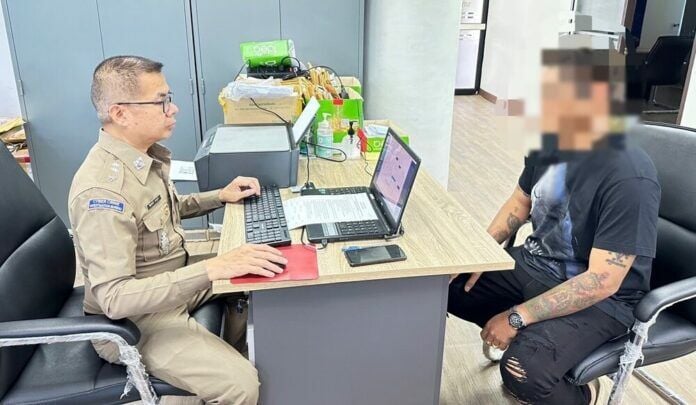
Police uncover illegal gambling ring in Ubon RatchathaniLegacy A covert sting operation led to the raid of an online lottery operator’s residence, uncovering an illegal gambling ring and revealing a flow of approximately 10 million baht per month through 12 interconnected bank accounts.
This incident aligns with the Thai government and the Royal Thai Police’s crackdown on all forms of technology-driven crime, particularly illegal online gambling.
Following orders from the Chief of Special Branch Police, a swift investigation was initiated to prosecute the online lottery bookmaker, the financier, and all associated parties. The police’s cyber unit traced the illicit operation to a publicly accessible Facebook page that advertised participation in lottery or underground lottery games through electronic systems.
An undercover agent infiltrated the network to gather incriminating evidence, which led to a warrant being issued by the Ubon Ratchathani District Court to search the suspect’s home in the Warin Chamrap district of Ubon Ratchathani Province.
However, upon executing the search warrant, only the suspect’s mother was found at the residence. The search ensued, leading to the seizure of evidence linked to the gambling operation.
Further investigation into the financial transactions uncovered multiple individuals connected through a dozen bank accounts, with roughly 10 million baht circulating each month. This discovery prompted an expansion of the investigation to unravel the entire network covertly.
The probe eventually identified a structured operation, leading to formal complaints and the initiation of legal proceedings against the three individuals involved. All three suspects appeared before the investigative officers to hear the charges against them. The case, registered as Criminal Case No. 55/2567, will proceed according to the law, reported KhaoSod.
Citizens are encouraged to report any suspicion or evidence of illegal gambling activities to the Anti-Online Crime hotline at AOC 1441, available 24 hours a day.
In related news, law enforcement officers in Samut Prakarn province made a significant bust, apprehending two individuals suspected of operating a substantial online lottery business.
The story Police uncover illegal gambling ring in Ubon Ratchathani as seen on Thaiger News.
23 April 23 2024Crime Newshttps://thethaiger.com/?p=740159 - Former officials to face charges for 2004 Tak Bai massacre
Criminal charges are set to be filed against nine former security officials involved in the 2004 Tak Bai massacre. Lawyers representing the victims’ families are spearheading this legal action. This move comes months before the expiration of the 20-year statute of limitations on the case, which is due to conclude in October this year. The …
The story Former officials to face charges for 2004 Tak Bai massacre as seen on Thaiger News.
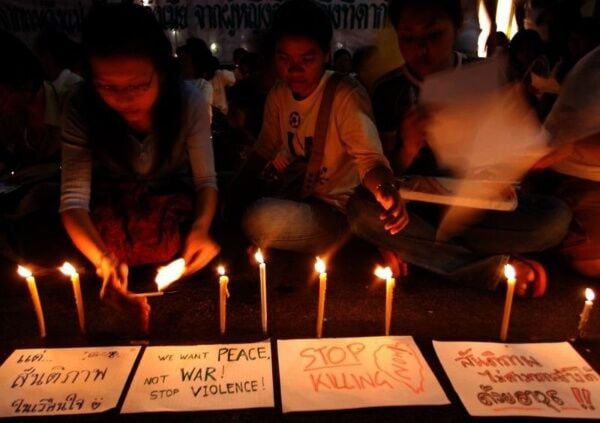
Former officials to face charges for 2004 Tak Bai massacreLegacy Criminal charges are set to be filed against nine former security officials involved in the 2004 Tak Bai massacre.
Lawyers representing the victims’ families are spearheading this legal action. This move comes months before the expiration of the 20-year statute of limitations on the case, which is due to conclude in October this year. The charges will be filed at the Narathiwat Provincial Court, with the accused facing allegations of unlawful detention, murder and malfeasance.
Adilan Ali-Ishoh, a lawyer from the Muslim Attorney Centre Foundation, revealed that all victims’ families had signed an agreement permitting the foundation to represent them in the legal battle against the authorities. Those facing charges include top southern army officers who were in charge of the crackdown plan and operations, along with key police and Interior Ministry officers.
The infamous Tak Bai incident involved 1,500 protesters rallying in front of the local police station in Narathiwat, demanding the release of six detainees on October 25, 2004. A brutal response from security authorities led to the deaths of seven people at the protest site. An additional 78 individuals died from suffocation or being crushed during transportation to the Ingkhayutthaborihan army camp in the Nong Chik district of Pattani province, 140 kilometres away.
The massacre, which occurred under the prime ministership of Thaksin Shinawatra, is widely regarded as a key factor sparking heightened violence in the three Muslim-majority southern border provinces. Thaksin apologised for the tragedy in 2022, stating he was not informed at the time that the army had taken control of the protest. The army chief at that time, General Prawit Wongsuwon, later became deputy premier in the previous government and currently heads the coalition Palang Pracharath Party.
Adilan Ali-Ishoh acknowledged that the forthcoming legal battle would not be an easy one but pledged to fight for justice on behalf of the victims and their families.
“I would like to thank all the people who continue to fight alongside us for justice. The road ahead will not be smooth but they stand ready for that.”
Independent investigation
Ali-Ishoh also expressed gratitude to the lawyers and volunteers who sifted through vast amounts of evidence to assemble the case.
The lawyer revealed to the Bangkok Post that the results of an independent investigation led by then-ombudsman Pichet Sunthornpipit would be crucial evidence to support the accusations against the nine accused.
The report, initiated by former Thai PM Thaksin Shinawatra to scrutinise the massacre, cited then-Fourth Army Region Commander Lieutenant General Pisan Wattanawongkiri, his deputy Lieutenant General Sinchai Nutsathit, and then-Fifth Infantry Division Commander Major General Chalermchai Wirunpeth for dereliction of duty during the rally.
Human rights advocates have been demanding justice for the victims and their families. While some victims and family members received financial compensation from the government, Amnesty International has criticised the lack of comprehensive reparations for the human rights violations committed by the officers involved, reported Bangkok Post.
The organisation noted last year on the 19th anniversary of the crackdown that the government had focused solely on financial compensation, neglecting to provide victims and their families with access to justice.
The story Former officials to face charges for 2004 Tak Bai massacre as seen on Thaiger News.
23 April 23 2024Bangkok Newshttps://thethaiger.com/?p=740127 - Strategies for combating educational inequality in Thailand
In Southeast Asia, Thailand faces a significant challenge that resonates regionally: educational inequality. This issue marks a clear divide in the quality of education between students in remote or economically disadvantaged areas and their urban peers. Such disparities not only limit individual potential but also hinder national development. As neighbouring countries like Vietnam and Indonesia …
The story Strategies for combating educational inequality in Thailand as seen on Thaiger News.

Strategies for combating educational inequality in ThailandLegacy In Southeast Asia, Thailand faces a significant challenge that resonates regionally: educational inequality. This issue marks a clear divide in the quality of education between students in remote or economically disadvantaged areas and their urban peers. Such disparities not only limit individual potential but also hinder national development. As neighbouring countries like Vietnam and Indonesia demonstrate progress in tackling these challenges, it becomes increasingly imperative for Thailand to adopt similar strategies.
This discussion aims to dissect the intricate issue of educational inequality in Thailand comprehensively. By examining successful international practices, we will propose policy recommendations, identify critical areas requiring immediate attention, and suggest actionable steps for relevant stakeholders. Join us as we explore how Thailand can transform its educational system for equitable outcomes across all regions.
Current efforts to address educational inequality
In Thailand, addressing the issue of educational inequality is a top priority for both the government and various non-governmental organisations (NGOs). There’s a concerted effort happening to close the existing gaps and ensure that every child has the opportunity to receive a quality education.

The image was generated by Dall-E. Overview of government and NGO Initiatives to combat Thai education Inequality
The Thai government, alongside various NGOs, implements programmes aimed at reducing educational disparities. At the forefront of these efforts is the improvement of access to education in remote and impoverished areas. This includes constructing schools, providing scholarships, and implementing lunch programmes to ensure that poverty does not hinder a child’s ability to attend school.
Government initiatives focus on policy reforms and funding allocations. One significant step has been the increase in budgetary allocations for education, with a particular emphasis on schools in rural regions. Policies also mandate a minimum set of resources for every school, aiming to level the playing field across urban and rural divides.
NGOs play a critical role in complementing government efforts. They provide resources such as books, teaching materials, and even volunteer teachers. Programmes like the Baan Makha School’s approach to empower communities and rely on local initiatives are exemplary. By encouraging community participation in educational development, these programmes demonstrate a commitment to sustainable solutions.
Moreover, collaborations between NGOs and the private sector, seen in initiatives like the one by the Baan Dek Foundation (BDF), aim to create systemic change. By partnering with construction companies, BDF ensures that the children of migrant workers receive education and support, addressing the educational needs of a particularly vulnerable group.
Strategies to reduce educational inequality
Addressing educational inequality requires multi-faceted strategies. This section outlines steps that aim to make a tangible difference.
Improving accessibility
- Infrastructure development in remote areas: Improving physical access to schools in rural areas ensures children can attend classes regularly. Investing in roads, transportation, and school buildings makes education more reachable.
- Digital learning resources to bridge educational inequality: Offering online resources and digital libraries opens up learning opportunities for students, no matter their geographical location. Platforms like Ookbee bring a vast array of materials to those who otherwise might miss out.
Enhancing quality of education
- Training programmes for teachers in marginalised communities: Upskilling teachers through targeted training programmes ensures that educators in remote areas can deliver quality education. Initiatives like Inskru provide platforms for continuous learning.
- Curriculum reforms to include diverse cultural perspectives: Revamping the curriculum to reflect various cultural and social backgrounds fosters inclusivity. It ensures all students see their identities reflected in their learning materials.
Policy and legislative framework
- Recommendations for laws and policies to ensure equal educational opportunities: Advocating for legislative changes that mandate equal access to quality education for every child is crucial. This includes funding allocations that prioritise disadvantaged schools.
- The role of international cooperation in addressing Thai educational inequality: Leveraging international partnerships can bring about new insights, resources, and technologies to address local challenges. Collaboration fosters cross-cultural learning and solutions.
Community and stakeholder engagement
- Importance of involving local communities to understand their needs better: Engaging with communities directly affects students’ learning environments. It ensures that interventions are relevant and effectively address specific challenges.
- Partnerships between schools, businesses, and non-profits to offer holistic education solutions: Forging collaborations between various stakeholders pools resources and expertise. It enables a comprehensive approach to solving educational inequality, incorporating everything from infrastructure to learning materials and teacher training.
By implementing these strategies, Thailand can make significant strides in reducing educational inequality, ensuring every child has access to quality education irrespective of their socio-economic status.
The road ahead

The image was generated by Dall-E. Addressing educational inequality in Thailand requires more than just increased funding or the construction of additional schools. It demands intelligent, inclusive strategies that ensure every child has access to education, particularly those in remote areas. By emphasising accessibility, improving quality, and fostering community participation, Thailand is making significant strides towards a more equitable education system.
Despite the lengthy journey and numerous obstacles ahead, with persistent efforts and collaborative action, achieving equal educational opportunities for all Thai children is becoming an attainable goal. Moving forward, it’s crucial to maintain this momentum to guarantee that every child in Thailand receives the quality education they deserve.
If you are looking for more education in Thailand, check out our article on ‘Understanding the Thai higher education system.’
The story Strategies for combating educational inequality in Thailand as seen on Thaiger News.
23 April 23 2024Educationhttps://thethaiger.com/?p=740105 - Mae Fah Luang Chiang Rai Airport joins customer experience elite
Mae Fah Luang Chiang Rai International Airport (CEI) clinched the coveted spot as the 100th accredited airport in ACI World’s Customer Experience Accreditation Programme. In a groundbreaking collaboration with Amadeus, ACI World’s Customer Experience Accreditation Programme is revolutionising the way airports worldwide approach passenger satisfaction. By equipping them with cutting-edge tools and strategies, this initiative …
The story Mae Fah Luang Chiang Rai Airport joins customer experience elite as seen on Thaiger News.

Mae Fah Luang Chiang Rai Airport joins customer experience eliteLegacy Mae Fah Luang Chiang Rai International Airport (CEI) clinched the coveted spot as the 100th accredited airport in ACI World’s Customer Experience Accreditation Programme.
In a groundbreaking collaboration with Amadeus, ACI World’s Customer Experience Accreditation Programme is revolutionising the way airports worldwide approach passenger satisfaction. By equipping them with cutting-edge tools and strategies, this initiative is propelling airports towards new heights of customer service excellence.
With global passenger traffic projected to skyrocket to 9.7 billion by the end of this year, and double by 2042, the need for exceptional customer experiences has never been more pressing. ACI World Director General Luis Felipe de Oliveira hails this milestone as a testament to airports’ commitment to a focus on passenger experience.
Amidst the celebration, Dr Kijmanawat Kerati, President of Airports of Thailand, expressed profound pride in Mae Fah Luang Chiang Rai International Airport’s dedication to elevating service standards and prioritising passenger needs.
The festivities kick off the ACI World #AirportCX Celebration Week from April 22 to 28, promising a week-long extravaganza dedicated to enhancing global travel experiences, reported Travel and Tour World.
ACI World is gearing up to host its annual Customer Experience Summit and Exhibition from September 23 to 26 in Atlanta, US, where industry leaders will converge to explore the latest trends and technologies shaping the future of airport customer experiences.
In related news, Don Mueang International Airport in Bangkok secured a top ten spot in the World’s Best Low-Cost Airline Terminals ranking, as announced by Skytrax. Suvarnabhumi International Airport also improved, climbing ten places to secure 58th position in the World’s Best Airport ranking.
Skytrax, a renowned website for reviewing and ranking airports and airlines worldwide, conducted the rankings based on surveys and user reviews. Participants in the survey rated airports based on factors such as public transport availability, cleanliness, design, staff service, facilities, and overall experience.
In other news, Thai Airways (THAI) boasts an enviable array of long-range jets, but behind the glamour lies a tale of surprises for passengers.
The story Mae Fah Luang Chiang Rai Airport joins customer experience elite as seen on Thaiger News.
23 April 23 2024Aviation Newshttps://thethaiger.com/?p=740146 - Boxing camp owner murdered in Buriram
A boxing camp owner known by many as Sia Dam was brutally murdered at a religious celebration in Buriram. Sia Dam, whose real name is being withheld, was a 56 year old boxing camp owner from Surin Province. The incident occurred yesterday when an unknown assailant shot him in the head and neck, leading to …
The story Boxing camp owner murdered in Buriram as seen on Thaiger News.
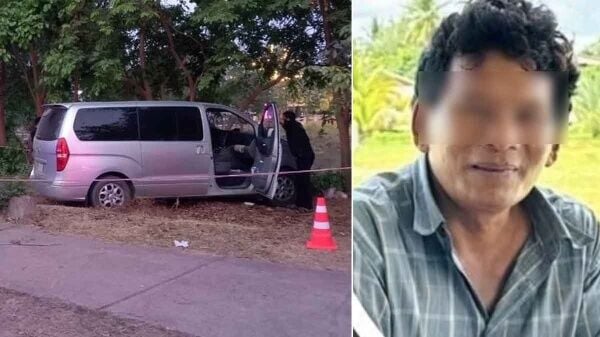
Boxing camp owner murdered in BuriramLegacy A boxing camp owner known by many as Sia Dam was brutally murdered at a religious celebration in Buriram.
Sia Dam, whose real name is being withheld, was a 56 year old boxing camp owner from Surin Province. The incident occurred yesterday when an unknown assailant shot him in the head and neck, leading to his death in his Hyundai van, which bore Cambodian licence plates after he had brought his boxers to compete at the event hosted by the abbot of Nong Teng Temple in Buriram Province.
Friends and colleagues of Sia Dam are struggling to come to terms with the loss. Chatri, a close associate of the deceased shared insights into the character of Sia Dam. Known for his generosity, particularly in the boxing world, Sia Dam often sponsored charity events, offering his fighters to participate without charging a fee.
The motive behind the ruthless killing seems to be a targeted hit, with Chatri implying that there were individuals who had a reason to want Sia Dam gone, dismissing any conflict within the boxing scene as a potential cause.
Further highlighting Sia Dam’s character, Chatri recounted how just last month, Sia Dam had organised a boxing event costing 300,000 baht at his residence, allowing everyone to watch for free. He was deemed a good person by many.
Whilst Chatri could not confirm whether Sia Dam’s business interests, which included a drinking water plant and public restrooms in the Chong Jom market, might have led to conflicts with others, he did not rule out the possibility.
Police from both Buriram and Surin provinces are conducting an intensive investigation, searching for CCTV footage that could shed light on the culprits. The area where the murder took place is known for a previous incident in March last year, where a cattle herder was killed and his vehicle stolen. However, the perpetrator in that case was captured only by chance in February.
Sia Dam’s past was not without controversy. He had been involved in a murder case over 20 years ago but Chatri believes this is unlikely to be connected to Sia Dam’s death, reported KhaoSod.
Additionally, conjectures about a Cambodian wife are considered to hold little relevance to the case at hand.
The story Boxing camp owner murdered in Buriram as seen on Thaiger News.
23 April 23 2024Crime Newshttps://thethaiger.com/?p=740002 - Narathiwat raid nets three bomb suspects, hunting for a fourth
A joint operation between police, military, and administrative officials in Narathiwat province has led to the arrest of three individuals suspected of orchestrating a bomb attack in front of a convenience store in the district of Chanae, southern Thailand. The suspects confessed to the crime, paving the way for a manhunt for a fourth accomplice. …
The story Narathiwat raid nets three bomb suspects, hunting for a fourth as seen on Thaiger News.
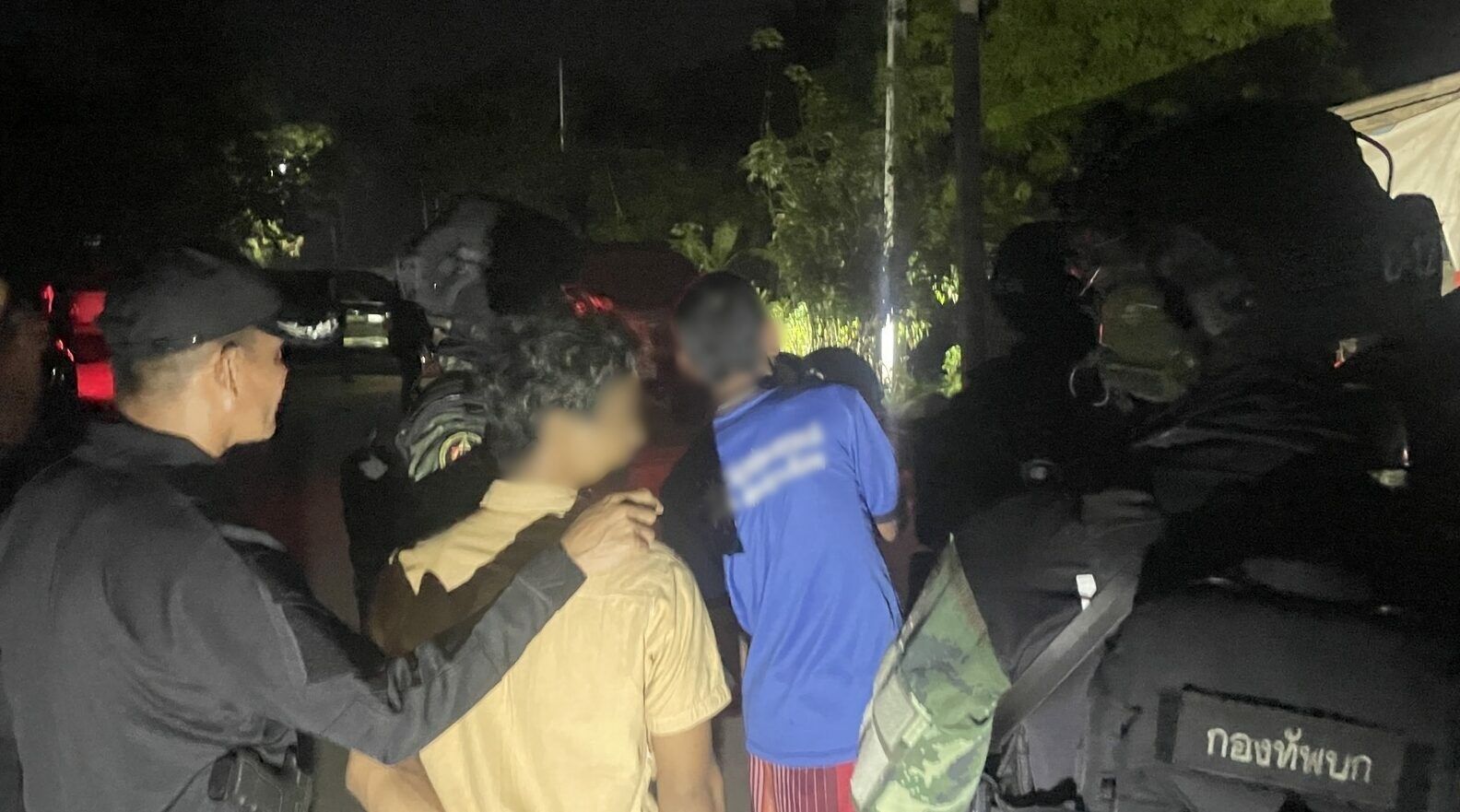
Narathiwat raid nets three bomb suspects, hunting for a fourthLegacy A joint operation between police, military, and administrative officials in Narathiwat province has led to the arrest of three individuals suspected of orchestrating a bomb attack in front of a convenience store in the district of Chanae, southern Thailand. The suspects confessed to the crime, paving the way for a manhunt for a fourth accomplice.
In the early hours of yesterday, law enforcement in Narathiwat province launched a coordinated search across three targeted locations. This decisive action followed intelligence from local sources indicating the presence of a four-person group suspected of a recent bombing near an electrical pole and a Krungthai Bank ATM in front of a Mini Big C store in Chanae district.
The incident, which occurred on April 4, was part of a larger pattern of property theft and suspected bomb attacks by the group.
Two of the targets were located in the Sri Sakhon district, while the third was in Chanae, where the explosive device was planted. The search led to the home of 21 year old Annop Puteh, where authorities uncovered a 9mm Smith & Wesson MP9c handgun with a magazine containing nine rounds. The second location was the residence of 20 year old Asree Jeha, and the third was the home of 21 year old Salahudeen Jehena.
After the search, the individuals were taken for questioning to specialised military interrogation centres, with Annop being interrogated at Task Force 41’s centre and Asree and Salahudeen at Task Force 46’s site. Salahudeen admitted his involvement in the attack, revealing that he rode a blue Honda Wave motorcycle with Annop as a passenger, placing the bomb at the ATM location.
Asree was identified as the driver of a Honda Scoopy motorcycle, with a man named Mang as a passenger, who placed the bomb near the electrical pole in the parking area, reported KhaoSod.
With the confession from Salahudeen, authorities are now intensifying efforts to capture the fugitive Mang, ensuring that he too faces the legal process for his involvement in the bombing.
The story Narathiwat raid nets three bomb suspects, hunting for a fourth as seen on Thaiger News.
23 April 23 2024Crime Newshttps://thethaiger.com/?p=740087 - Drunk driver strikes police officer in early morning Patong collision
A drunk driver in Patong, Phuket, collided with a police officer on patrol early this morning. The incident occurred near Patong Hospital at the intersection of Phra Mettha Road and Sai Nam Yen Road. Patong Police Station officers were informed of the incident around 4.30am, today, April 23. The drunk driver was identified as 21 …
The story Drunk driver strikes police officer in early morning Patong collision as seen on Thaiger News.

Drunk driver strikes police officer in early morning Patong collisionLegacy A drunk driver in Patong, Phuket, collided with a police officer on patrol early this morning. The incident occurred near Patong Hospital at the intersection of Phra Mettha Road and Sai Nam Yen Road. Patong Police Station officers were informed of the incident around 4.30am, today, April 23.
The drunk driver was identified as 21 year old Amornlak Bunsiri from Satun, who sustained minor injuries from the collision.
The police officer, a Phuket native Police sergeant Major Teerayut Samran, suffered a minor injury to his right ankle.
Rescue workers from the Kusoldharm Foundation provided first aid to Pol. Sgt. Maj. Teerayut before assisting him into the hospital.
Amornlak had been operating her Honda Wave 125 motorcycle northbound along Phra Mettha Road when she ran a red light to turn onto Sai Nam Yen Road.
At the same time, Pol. Sgt. Maj. Teerayut was leaving Patong Police Station on his Yamaha NMAX police motorbike to start his patrol, leading to the collision.
Amornlak was taken to Patong Police Station, where an alcohol test returned a positive result with a reading of 114mg per decilitre (a BAC of 0.114). She has since been charged with drunk driving causing injury to others.
In a separate incident earlier, a French national, 21 year old Mehdi Ghandi, was arrested for drunk driving on Phra Mettha Road.
He was stopped and tested for alcohol between 12.30am and 2.30am, yielding a positive result with a reading of 63 milligrammes per decilitre (a BAC of 0.063). Ghandi has also been charged with driving while intoxicated.
These incidents serve to highlight the persistent issue of drink driving in the region, with authorities continuing their efforts to address and mitigate the problem to the best of their abilities.
Local law enforcement agencies are urging drivers to adhere to traffic rules and avoid driving under the influence to ensure safety on the roads.
The story Drunk driver strikes police officer in early morning Patong collision as seen on Thaiger News.
23 April 23 2024Crime Newshttps://thethaiger.com/?p=740132

